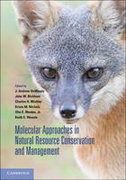
Molecular approaches in natural resource conservation and management
DeWoody, J. Andrew
Bickham, John W.
Michler, Charles H.
Nichols, Krista M.
Recent advances in molecular genetics and genomics have been embraced by manyin natural resource conservation. Today, several major conservation and management journals are now using 'genetics' editors to deal solely with the influxof manuscripts that employ molecular data. The editors have attempted to synthesize some of the major uses of molecular markers in natural resource management in a book targeted not only at scientists but also at individuals activelymaking conservation and management decisions. To that end, the text features contributors who are major figures in molecular ecology and evolution - many having published books of their own. The aim is to direct and distil the thoughts of these outstanding scientists by compiling compelling case histories in molecular ecology as they apply to natural resource management. INDICE: 1. Biodiversity discovery and its importance to conservation Rodney L. Honeycutt, David M. Hillis, John W. Bickham and Amy B. Baird; 2. Gene flow, biodiversity and GM crops: weedy rice in Thailand B. Schaal, W. J. Leverich, S. Jamjod, C. Maneechote, A. Bashir, A. Prommin, A. Punyalue, A. Suta, T. Sintukhiew, A. Wongtamee, T. Pusadee, S. Niruntrayakul, B. Rerkasem, Robert H. Devlin and Fredrik L. Sundstrom; 3. A community and ecosystem genetics approachto conservation biology and management Thomas G. Whitham, Catherine A. Gehring, Luke M. Evans, Carri J. LeRoy, Randy K. Bangert, Jennifer A. Schweitzer, Gerard J. Allan, Robert C. Barbour, Dylan G. Fischer, Bradley M. Potts, Joseph K. Bailey and Jeff Holland; 4. Vertebrate sex determining genes and their potential utility in conservation, with particular emphasis on fishes J. Andrew DeWoody, Matthew C. Hale, John C. Avise and Lisette Waits; 5. Historical and contemporary dynamics of adaptive differentiation in European oaks Antoine Kremer,Valerie Le Corre, Remy J. Petit, Alexis Ducousso and Stephen R. Palumbi; 6. Association genetics, population genomics, and conservation: revealing the genes underlying adaptation in natural populations of plants and animals Krista M.Nichols, David B. Neale, Jake Gratten, Alastair J. Wilson, Allan F. McRae, Dario Beraldi, Peter M. Visscher, Josephine M. Pemberton and Jon Slate; 7. Hybridization in threatened and endangered animal taxa: implications for conservation and management of biodiversity Kelly R. Zamudio, Richard G. Harrison and Marjorie Matocq; 8. Pollen and seed movement in disturbed tropical landscapes J.L. Hamrick, Joseph D. Busch, Jennifer McCreight and Peter M. Waser; 9. Implications of landscape alteration for the conservation of genetic diversity of endangered species Paul L. Leberg, Giridhar N. R. Athrey, Kelly R. Barr, Denise L. Lindsay, Richard F. Lance, Julie R. Etterson and Rebecca M. Holmstrom; 10. Integrating evolutionary considerations into recovery planning for Pacific salmon Robin S. Waples, Michelle M. McClure, Thomas C. Wainwright, Paul McElhany,Peter Lawson and Kermit Ritland; 11. Using molecular methods to improve the genetic management of captive breeding programs for threatened species Jamie A.Ivy, Robert C. Lacy and Yousry El-Kassaby; 12. Wildlife reintroductions: the conceptual development and application of theory Olin E. Rhodes, Jr, Emily K. Latch, Lisa Worthen, Charles Michler and Keith Woeste; 13. Evolutionary toxicology Lee R. Shugart, Chris W. Theodorakis, John W. Bickham, Stan D. Wullschleger and David J. Weston.
- ISBN: 978-0-521-73134-8
- Editorial: Cambridge University
- Encuadernacion: Rústica
- Páginas: 374
- Fecha Publicación: 01/06/2010
- Nº Volúmenes: 1
- Idioma: Inglés
